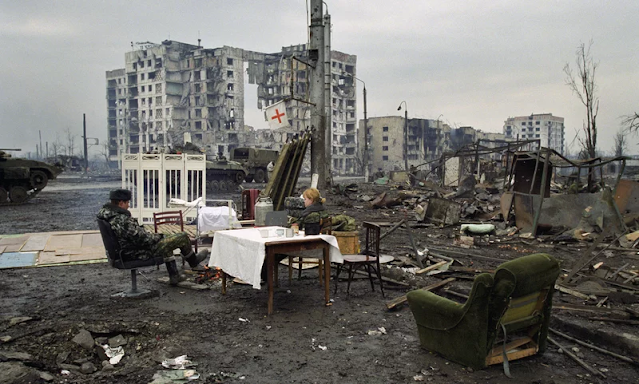'Because things don’t appear to be the known thing; they aren’t what they seemed to be
neither will they become what they might appear to become.'
Posted by Martin Cohen
But pause to look at this image. There’s a bizarre juxtaposition of suburban normalcy and wartime horror here. For a start, the table set with four chairs. Who else will be coming to dinner? Notice at the moment the two soldiers are a man and a woman, again echoing many a more homely, family scene.
Of course, as with most picnics, it is the setting that makes the moment, but here it is a nightmare scene of blasted apartment blocks and grey, smoking ruins. Not the family car, but the “family tank” is parked nearby.
On the table, the actual food is rather meagre.which may explain why both figures at the table look, frankly, rather miserable.


2 comments:
In some way, in some place, this seems to happen every day. The human heart is drawn to it. "It's over. It's gone. Now, let's get down to the real things of life."
The application of power, whether it be in, say, the USA, Mali, or Russia, always runs counter to the domestic scene. The question is, to what extent must it run counter to the domestic scene, if at all.
The image strikes me less as a picnic than a brief pause by two soldiers in states of torpor, emotionally and physically worn down by the scorched-earth toll on the everyday symbols of society in the background. What was once unnormal becomes normal. Only hulls remain.
On a positive note, the seeming casualness and resignation of the two central figures reminds us of humans’ indomitable spirit in the face of punishing adversity. Yet it seems wasted. There’s irony in the remaining hulls. We might presume the two are defending what in their mind is the preservation of civilization.
On a sternly negative note, we’re reminded of humans’ self-destructive instincts, for which there seems no cure: the ubiquity and endlessness and mercilessness of war — the hegemonic grappling for power and control — since time immemorial. Yet, might there be the seeds of resurrection in those hulls?
Post a Comment